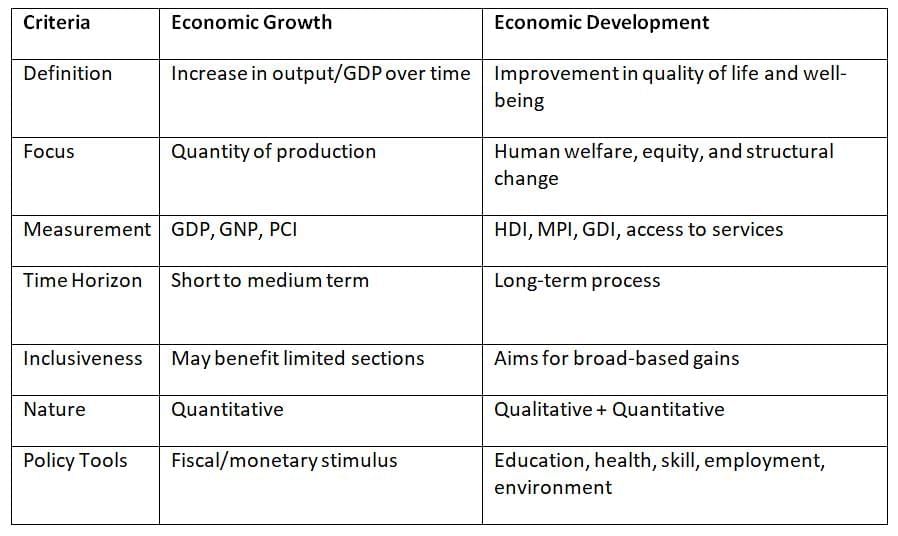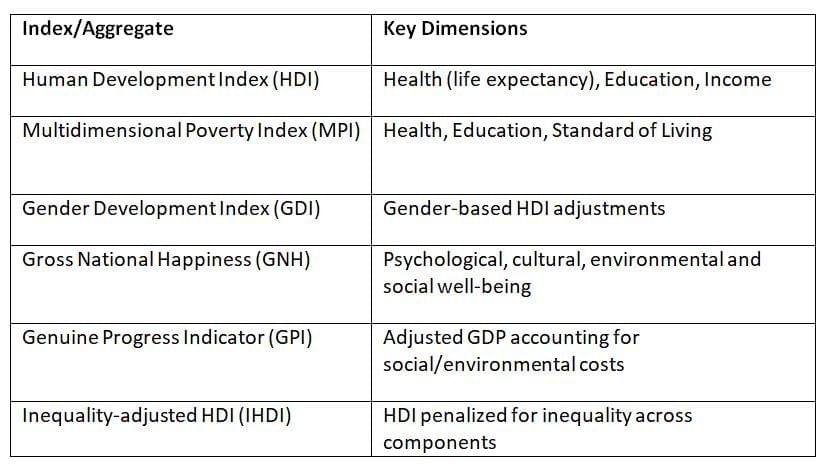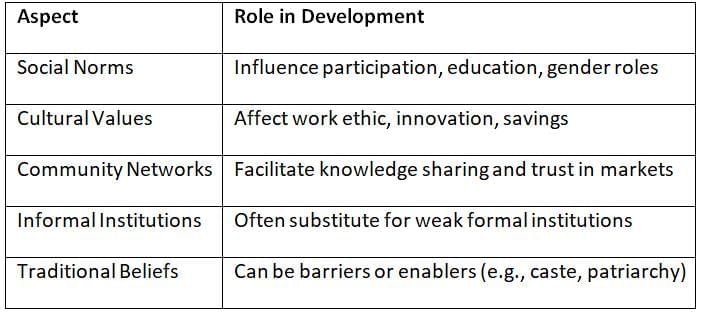UPSC Exam > UPSC Notes > Indian Economy for UPSC CSE > Cheat Sheet: Growth, Development and Happiness
Cheat Sheet: Growth, Development and Happiness | Indian Economy for UPSC CSE PDF Download
Economic Growth vs Economic Development

Measurement of Development

Happiness and Well-being
- Happiness reflects subjective well-being influenced by economic and non-economic factors.
- Components used in global surveys:
- Per capita income
- Social support systems
- Healthy life expectancy
- Freedom to make life choices
- Trust in government and low corruption
- Generosity and social cohesion
- India ranked 118 out of 146 in the World Happiness Report 2025
Social Norms, Culture and Development

Values and Economics
- Economic decisions are influenced by moral, ethical, and cultural values.
- Values affect:
- Trust and cooperation in transactions
- Attitude towards risk, saving, and investment
- Responsibility toward environment and future generations
- Social and moral incentives often matter alongside material incentives.
Human Behaviour and Development
- Classical economics assumes rational, self-interested agents.
- Behavioural economics shows:
- Decisions often guided by biases (e.g., loss aversion, framing)
- Social influences (peer pressure, identity) affect economic choices
- Policies using "nudges" can improve outcomes (e.g., defaults in pension schemes)
- Development interventions must consider real human behaviour, not idealised models.
The document Cheat Sheet: Growth, Development and Happiness | Indian Economy for UPSC CSE is a part of the UPSC Course Indian Economy for UPSC CSE.
All you need of UPSC at this link: UPSC
|
108 videos|425 docs|128 tests
|
FAQs on Cheat Sheet: Growth, Development and Happiness - Indian Economy for UPSC CSE
| 1. What is the difference between economic growth and economic development? |  |
Ans.Economic growth refers to an increase in the output of goods and services in an economy, typically measured by the rise in Gross Domestic Product (GDP). In contrast, economic development encompasses broader aspects, including improvements in living standards, education, health, and environmental sustainability. While growth is quantitative, development is qualitative, focusing on enhancing the overall well-being of the population.
| 2. How is economic development measured? |  |
Ans.Economic development can be measured using various indicators beyond GDP. Common metrics include the Human Development Index (HDI), which combines life expectancy, education level, and per capita income; poverty rates; inequality measures; and access to essential services such as healthcare and education. These indicators provide a more holistic view of a country's development status.
| 3. What role does happiness and well-being play in economic development? |  |
Ans.Happiness and well-being are increasingly recognized as crucial components of economic development. Policies aimed at enhancing well-being can lead to a more productive workforce, lower healthcare costs, and greater social cohesion. Surveys and studies often show that higher levels of happiness correlate with better economic outcomes, making well-being an important goal alongside traditional economic indicators.
| 4. How do social norms and culture influence economic development? |  |
Ans.Social norms and culture significantly impact economic development by shaping behaviors, values, and priorities within a society. Cultural attitudes towards education, work ethic, gender roles, and innovation can either facilitate or hinder economic progress. For instance, cultures that prioritize education tend to have higher innovation rates, leading to faster economic development.
| 5. What is the relationship between values and economics in the context of development? |  |
Ans.Values play a critical role in economics, especially concerning development. The ethical framework within which economic decisions are made can influence policies, resource allocation, and priorities. Societies that value inclusivity and sustainability are likely to pursue development strategies that promote equitable growth and environmental stewardship, contrasting with those that prioritize short-term profits over long-term welfare.
Related Searches
















